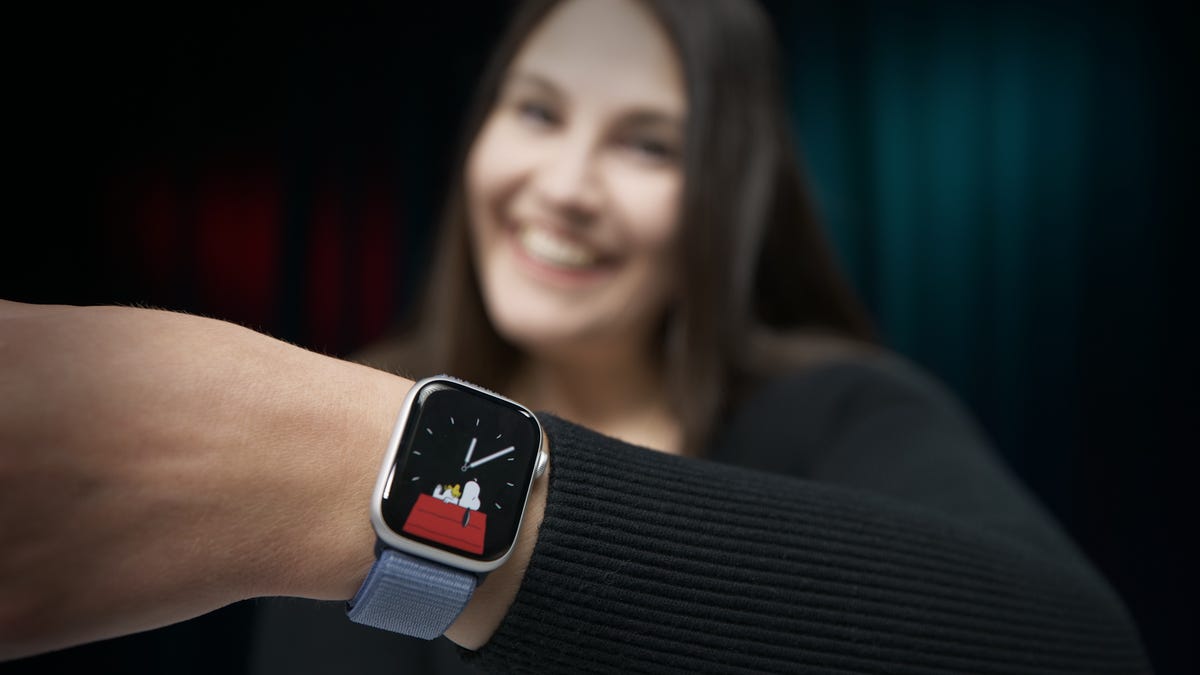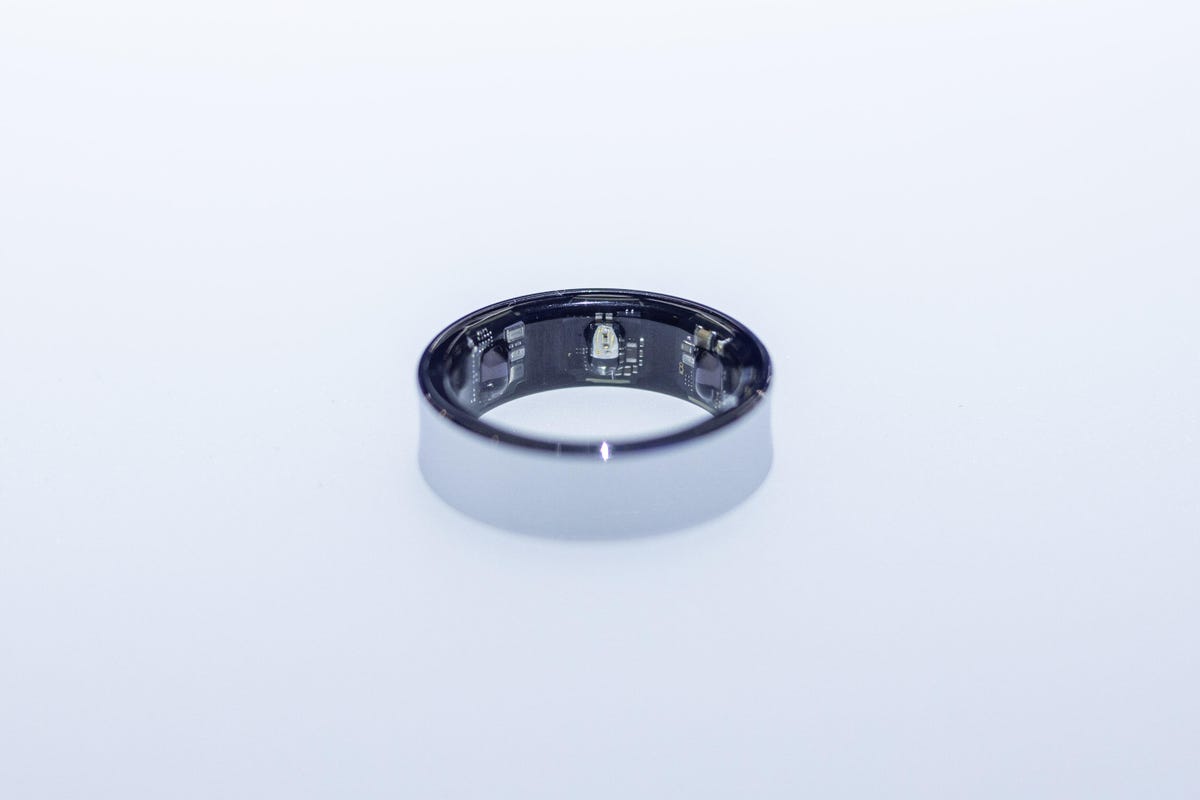On Jan. 17, 2024, an unexpected announcement from Samsung had a surprising effect on me. I was sitting in the SAP Center in San Jose for the Galaxy Unpacked event, during which the company unveiled the Galaxy S24 series. The keynote went as expected until the end, when Samsung teased the Galaxy Ring. In a very un-Patrick moment I thought, “I want this and I don’t know why.”
How could I not be curious after seeing this?
Samsung’s reveal of the Galaxy Ring at its Unpacked event.
The Galaxy Ring is packed with sensors and it records health data including your heart rate, movement and sleep. It doesn’t have a screen and it looks fairly discreet. After some introspection, I realized that it could be the smart device I’ve been looking for.
I’ve always had a weird thing about wearing jewelry, like watches and rings. I spent a number of years working as a carpenter building sets for operas, displays for museums and even a zoo enclosure for monarch butterflies. There’s nothing as wonderful as having butterflies land on you while you’re trying to fix a leaky Aztec-inspired fiberglass waterfall and pool.
Read more: Best Samsung phone for 2024
I’ve never been a ring person, but I enjoyed wearing watches until I scuffed one up while sanding a flat (part of a fake wall used on theater, film and TV sets). The experience was enough to make me wary of wearing watches. This isn’t the sole reason I hate smartwatches, but it is certainly part of my origin story. Smartwatches add an entire other level of complexity that I just don’t need, and they just don’t look as good or striking as a regular wristwatch.
The Galaxy Ring isn’t the first smart ring; there are also rings from Oura, Ultrahuman, Evie and others. But with its minimalist, distraction-free design, it could be the ideal complement to my phone. If Samsung wants the Galaxy Ring to be a hit beyond just early adopters, it needs to keep everything about the ring simple enough to court smartwatch haters like me.
My problem with smartwatches

I will never be this happy person wearing a smartwatch.
I can see the appeal in tracking my steps or capturing a workout. But I don’t like the idea of wearing the same band or smartwatch every day to get those benefits. I like the idea of a discrete tracker that doesn’t make me feel like I’m constantly connected to my phone all the time.
Smartwatches like the Apple Watch are basically mini versions of our phones and require more of my attention than my Seiko automatic wristwatch. And while I still think Dick Tracy’s watch is a crazy cool movie and comic gadget fantasy, he didn’t have to deal with Slack notifications, app updates, finding time to charge it or having it be out of sync with his phone.
I’m not the only person on a quest for simplifying how electronics show up in my life. Feature phones, older “simpler” smartphones and digital point-and-shoot cameras from a decade ago are seeing a resurgence as people aim to minimize the prominent role that phones occupy in their lives. And while the Galaxy Ring isn’t a retro product, it might offer a similar appeal.
CNET’s Lisa Eadicicco connected the dots for me in her story about how smart rings are like fitness bands when they first came out, albeit much more sophisticated and accurate.
What Samsung needs to get right

The Galaxy Ring has sensors on the inside to measure health metrics like your heart rate.
One reason I am intrigued by the Galaxy Ring is because it’s from Samsung, a company with a long history of making personal electronics like smartphones and smartwatches. I don’t mean to throw any shade on a company like Oura, but I feel more comfortable dropping money on a new product from an established company than one I know primarily from Kim Kardashian.
And while years of testing Samsung phones has instilled me with some faith in the company, that doesn’t mean it can do no wrong, especially considering Samsung doesn’t have the best track record with first generation products (Remember the Galaxy Gear, anyone?) So, to help the 55-year-old electronics company avoid such dissuasions, here are a few things that the Galaxy Ring needs to nail to woo smartwatch haters like me.
The Galaxy Ring’s price should be ridiculously appealing. Between $200 and $250 is the sweet spot, but the closer Samsung can get the price to $200 (or less), the better. I also hope Samsung doesn’t add an additional subscription fee. I want to buy this ring once, not be paying for it every month like the Oura Ring which has a $6 monthly subscription fee, on top of $300 or $400 for the actual ring.
Next, Samsung needs to make the Galaxy Ring compatible with Android and iOS phones. To quote the Mandalorian, “This is the way.” Keeping the ring exclusive to Samsung, or even just to Android phones, will deter people from buying it. Samsung is more likely to have an iPhone user fall in love with the Galaxy Ring and want to buy a Galaxy phone (think of Apple’s iPhone halo strategy) than it is to convince an Apple faithful to buy both a ring and a phone at the same time. The ring could be a hook for drawing iPhone loyalists into Samsung’s, well, galaxy.
The last thing Samsung needs to get right is battery life. I don’t want to worry about charging yet another device each day — otherwise I’d be more inclined to get a smartwatch or fitness band. If the Galaxy Ring’s battery life is closer to a week on a single charge, like the Oura Ring, Samsung will have won me over.
Will all (or any) of my hopes for the Galaxy Ring come true? Or will the Galaxy Ring just be another wearable I’ll end up avoiding because it falls short on its simplicity and value? We’ll have to wait for Samsung to launch it to find out.




















+ There are no comments
Add yours